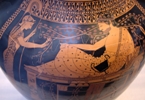From John Hale’s Lords of the Sea, The Epic Story of the Athenian Navy and the Birth of Democracy.
Hale is a powerful writer — his opening two-paragraph description of a trireme’s pulsing, relentless approach will make the blood surge in your own veins. And he has a strong thesis about the causal role that naval power had in Athenian democracy:
“Without the Athenian navy there would have been no Parthenon, no tragedies of Sophocles or Euripides, no Republic of Plato or Politics of Aristotle. Before the Persian Wars Athens produced no great traditions of philosophy, architecture, drama, political science, or historical writing. All these things came in a rush after the Athenians voted to build a fleet and transform themselves into a naval power in the early fifth century B.C.” (xxiv-xxv).

Themistocles was the initiator of the plan for the dramatic expansion of Athens’ navy. The discovery of a new vein of silver at Laurium enriched the Athenians, and in 483 BCE Themistocles convinced them to use the wealth for building triremes instead of a general distribution for private purposes.
The new powerful navy enabled the Athenians and their allies to defeat the Persians at Salamis in 480, extend and protect their commercial network, and exert political influence all over the Aegean and beyond. The defeat of the Persians also had cultural implications as, for example, Aeschylus’ The Persians was inspired by the victory and produced in 472.
Hale pushes further: “The navy was thus the origin of Athens’ extreme form of democracy” (xxvii). The Athenians did not use slaves for their military battles, only free men. Themistocles’ original plan called for the building of 100 new triremes. Each trireme required 170 oarsmen. Thus, one hundred triremes would require 17,000 men. That many men as a group could exert significant political influence, and most of those men would have to come from the thetes, the lowest class of citizens. Thus, Athens’s decision to expand its navy extended the scope of its democracy.
At least two kinds of social causation are at work in Hale’s interpretation.
One kind of cause is that which establishes a new trend. For example, a revolution that overthrows a monarchy and institutes a democracy. In 510 BCE, for instance, Kleisthenes and his clan overthrew the tyrant Peisistratus’s son Hippias’ regime, and after a short transition time Kleisthenes then moved Athens in a strongly democratic direction.
Another kind of cause is that which enables an existing trend to continue. And of these enabling causes, some are defensive and some are empowering.
The navy as a defensive enabling cause: If the Athenians hadn’t had a powerful navy, they wouldn’t have defeated the Persians at Salamis; and if they hadn’t defeated the Persians, Athenian democracy would not have continued.
The navy as empowering cause: If they hadn’t had a strong navy, the Athenians would not have become as wealthy through commerce and political tributes; and without that wealth they would not have been able to support their cultural activities on the astonishing scale they did.
I don’t think Hale is arguing for the navy as an establishing cause, though he is making some very strong initial claims. The navy does not become a significant factor until after 483, and before that many significant things were going on:
*Philosophy: Thales and the Ionians such as Heraclitus were prior to Themistocles, and Parmenides from Elea was of Themistocles’ generation.
*Politics: Kleisthenes’s democratic reforms were in place already for a generation prior to Themistocles’ naval proposal.
*Military: The Battle of Marathon, which energized the Greeks with the belief that they could defeat the vastly numerically-superior Persians, was 490 BCE.

*Art: The development of red-figure vase painting, which sparked artistic innovation and dominated the ceramics market, began in Athens in 530 BCE.
*Economics: Coinage had been introduced and was already widely used among the Greeks. Coinage made possible longer-term storage of wealth and the easier development of an extended commercial system, along with all the implications for wealth, cosmopolitanism, and political leverage that implies.
So I suspect that Hale is arguing for the navy as a significant (or as the most significant) of the enabling causes. I am now into the third chapter of Lords of the Sea and looking forward to more strong writing and provocative history.
Comments are closed.